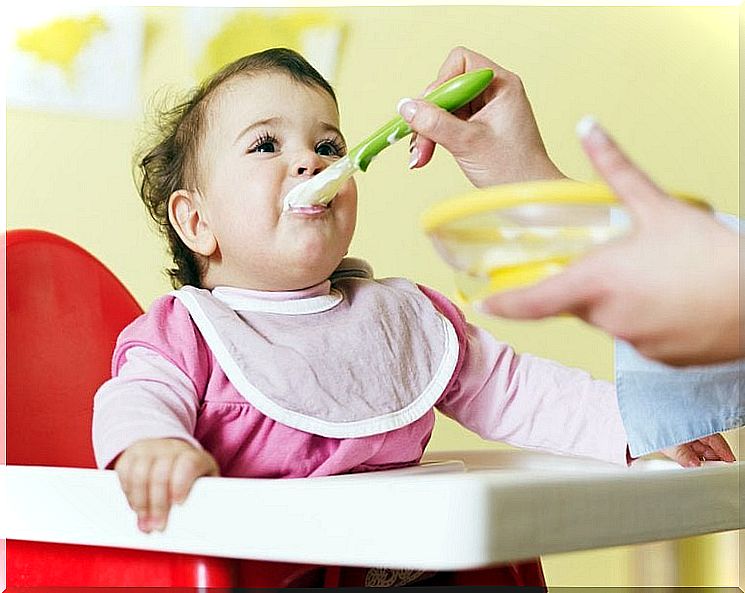7 Vegetable Purees For Babies

You can start giving your baby vegetable purees after it is 6 months old.
Milk, whether breast milk or substitute, can only cover all children’s nutritional needs until they are six months old. Then you need to start thinking about varying your baby’s diet and introducing new foods.
Vegetable purees are the perfect first food to present to your baby.
We will give you some simple recipes here. Remember that you can vary them according to your child’s taste and age.
7 vegetable purees for babies
Here are seven delicious and practical recipes for vegetable-based purees:
Mashed green beans
Ingredients
- 200 grams of fresh green beans
- Water or infant milk
- Olive oil
Do this:
- Start by rinsing and chopping the green beans into tiny pieces.
- Steam them for 10-15 minutes.
- Cool the beans under running cold water so that they retain their color.
- Finally, strain the beans and mix them together with a few drops of olive oil (and milk for your baby) until you get a soft and smooth texture.
Spinach puree
Ingredients
- 150 grams of spinach leaves
- Water
- Olive oil
Do this:
- Rinse the spinach leaves thoroughly and place them in a saucepan of boiling water and cook for 5 minutes.
- Finally, mix the spinach with a little water and a few drops of oil.

Carrot and zucchini puree
Ingredients
- 2 small carrots
- 3 zucchini
- 2 tablespoons grated cheese
- 1 basil leaf
- Olive oil
Do this:
- Rinse and peel the vegetables.
- Chop the vegetables into cubes and steam them for 20 minutes.
- Finally, mix all the ingredients until you get a thick, smooth consistency.
Carrot and potato puree with blue cheese
Ingredients
- 1 potato
- 2 small carrots
- 10 cl baby milk
- 1 piece of blue cheese (25 to 30 grams)
Do this:
- Rinse, peel and chop the vegetables into small pieces.
- Put potatoes and carrots in a saucepan of water and cook for 15 to 20 minutes.
- Heat the milk in a separate saucepan and add the sliced Roquefort cheese to the pan until the cheese melts.
- Finally, mix all the ingredients together until you have a smooth and even puree.
Pumpkin puree
Ingredients
- 1 bit pump
- 1 bit cheese
- Water
- Olive oil
Do this:
- Peel a squash, grate it and cut off the skins.
- Chop the pumpkin into small pieces.
- Boil the pumpkin cubes for 15 minutes.
- Finally, when cooked through, mash the pumpkin pieces. Then add cheese, a few drops of oil and a little water.
Asparagus puree
Ingredients
- 5 green asparagus
- 1 potato
- 1 tablespoon whipped cream
Do this:
- Start by peeling the asparagus and rinsing it under water, then cut it into small pieces.
- Rinse and peel the potatoes, then chop them into small cubes.
- Steam the asparagus and potatoes for 10 to 15 minutes.
- Check if they are finished with a knife tip. Both the asparagus and the potatoes should be soft.
- Mix thoroughly until you get the consistency you want . Asparagus can be very stringy, so it is best to pass the puree through a sieve to get rid of them.
- Finally, add a spoonful of cream.
Potatoes and artichoke puree
Ingredients
- 2 artichoke hearts
- 1/3 sweet potato
- Water
- 1 teaspoon olive oil
- 1 teaspoon pasteurized whipped cream

Do this:
- Start by rinsing and peeling the sweet potatoes, then chop it into small cubes.
- Rinse the artichoke. Steam the artichoke and potatoes until both are soft.
- Mix thoroughly until you get a consistency that suits your child’s age. You can add water or vegetable broth while stirring.
- When ready to serve, add a teaspoon of olive oil and a teaspoon of whipped cream to make the puree creamy.
To sum up, vegetable purees must be properly cooked and varied. Try to avoid vegetables with a sharp taste and those whose fermentation can cause stomach pain, such as celery, peas and turnips.
Remember that the best vegetables at this age are those that are easy to digest. Good examples are carrots, green beans, spinach and zucchini.









